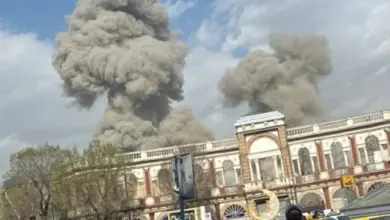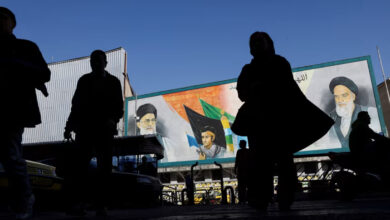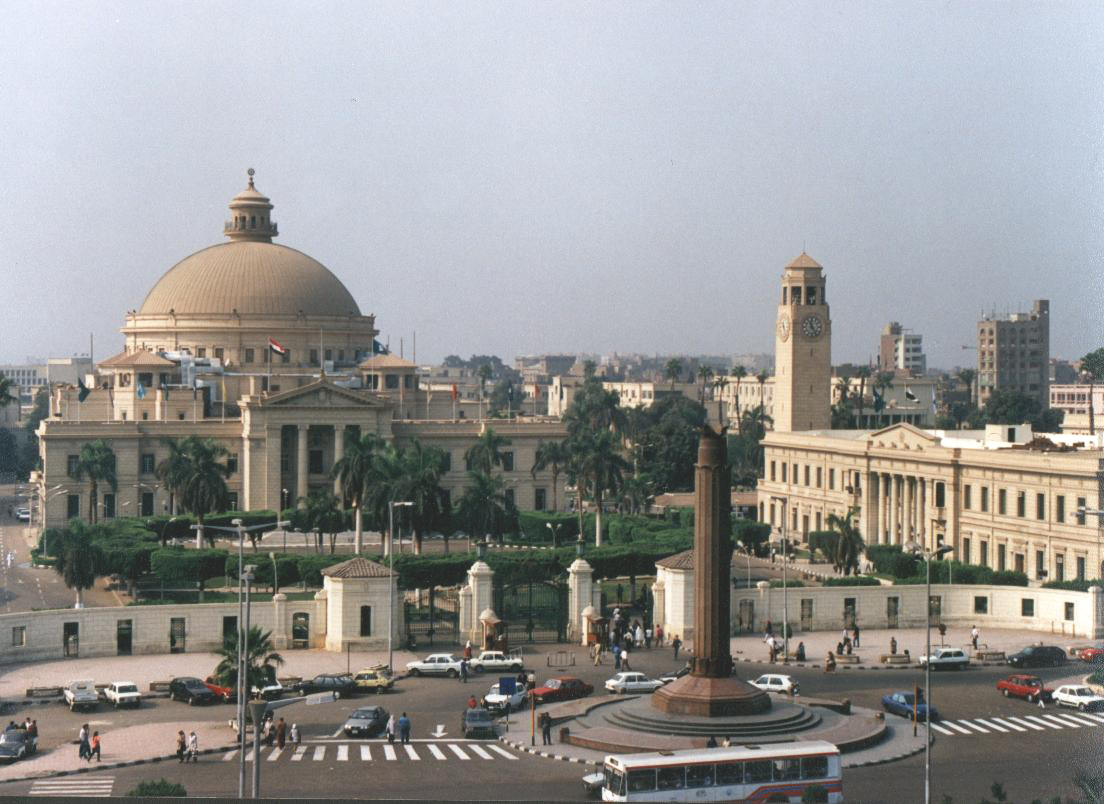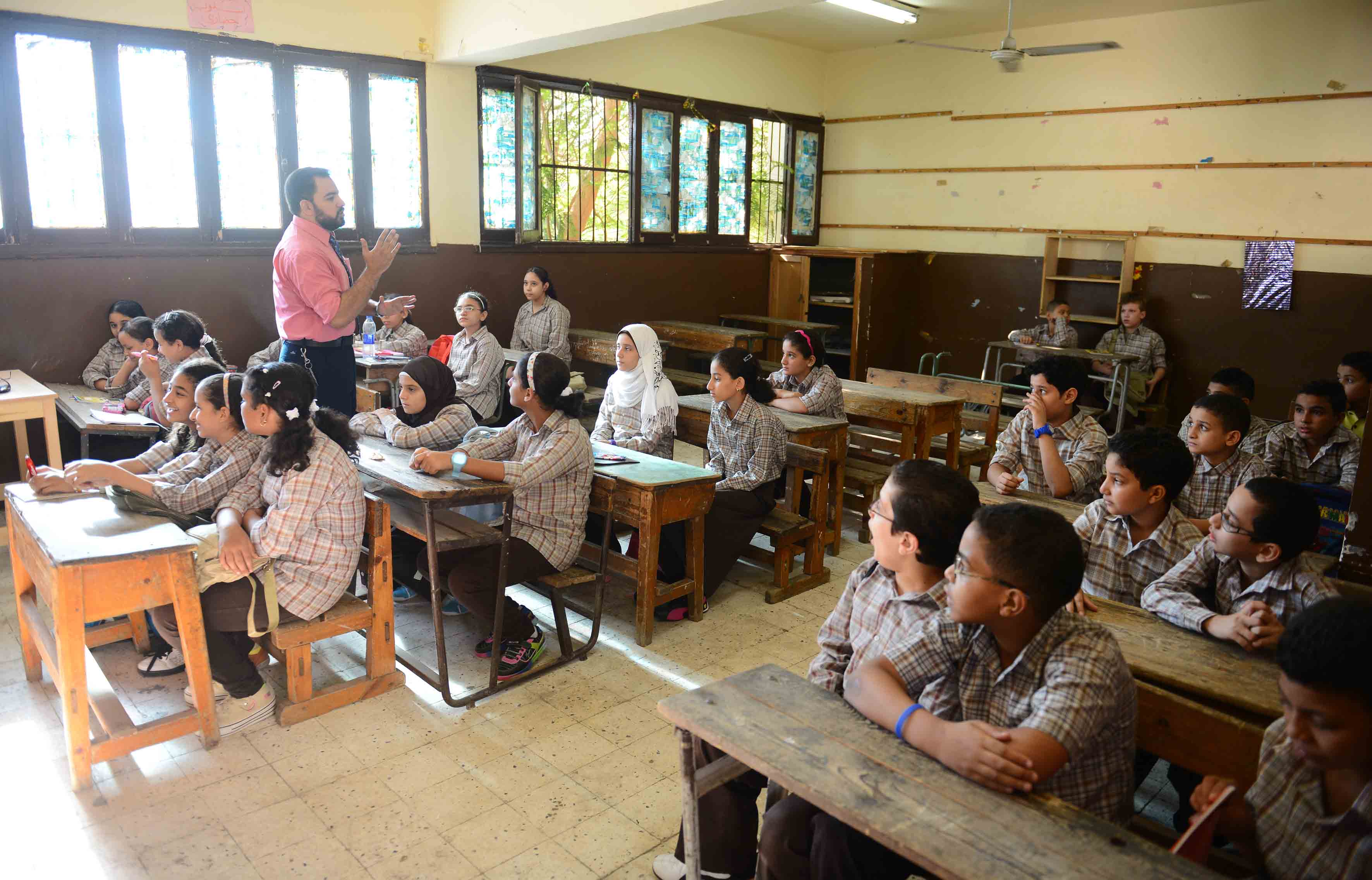Hundreds of student protesters marched to the Ministry of Education on Tuesday afternoon, demanding immediate changes to the national curriculum and adjustment to ministry policies.
With a wide variety of banners, signs, and chants denouncing policies of the former Minister of Education Ahmed Zaki Badr’s and those established by his predecessors, the students collectively vowed to remain in front of the ministry until their demands–printed up on a 21-point list–were met.
“We are calling for preliminary adjustments to be made to the national curriculum,” stated Hussein Haggag, an 18-year-old representative of the 1 March Student Movement, a name chosen by the young protesters to describe their protests. “We’re not doing this for ourselves– most of us are only a year or a few months from graduation,” Haggag explained. “We’re doing this for future generations, so that they don’t suffer like we did, so that they can have the opportunities we were denied.”
“Education is the basis for all progress,” Haggag said. “It’s shameful, the extent we’ve fallen behind, as a country. The US, China, and Japan are far more advanced by comparison, and education here continues to deteriorate.” Haggag argues that such an extreme disparity will only make it more difficult–if not impossible–for future Egyptian generations to compete in the global economy.
Despite taking most bystanders by surprise, the student protest has been planned for a while. Like other protests that have roiled the country since the beginning of Egypt’s popular revolution on 25 January, this student protest was organized through Facebook.
“There are thousands of students like us doing the exact same thing this very moment all throughout Egypt,” claimed Haggag. “Of course, those in other governorates couldn’t join us today at the ministry, but they’re with us in spirit, and we’re protesting on their behalf.”
The protesters seemed jovial, with a great deal of students bringing drums and assorted musical instruments, while others danced and cheered. Linking arms, they formed rings and skipped around each other.
However, the atmosphere quickly grew tense with the sudden appearance of a vehicle belonging to the armed forces, and even more so when one student decided to confront the armored truck with a switchblade. He was removed from the scene by fellow protesters who frantically chanted “Peaceful! Peaceful!” as several soldiers emerged from the vehicle. The chants were similar to those used by Tahrir protesters in their unsuccessful attempt to dissuade security forces from resorting to violence.
“Before 25 January, we knew nothing, and we could say nothing about what was going on. We had no rights,” explained Samah Talaat, also 18, as a crowd of students around her rapidly grew. “Now things are supposedly different. The revolution was successful, but only at its earliest stages. We need to take this opportunity to make sure that the change it brings will be all-inclusive, not superficial.”
“We’ve been trained to memorize and not understand for years,” Talaat explains, referring to the Ministry of Education’s well-known reliance on rote learning. “They cram our heads with useless, and sometimes false, information, and we spit it back at them word for word and nobody learns anything. Students have no personality, no opinions, and no future.” Over the years, Egypt’s educational system has been subject of constant criticism for not encouraging critical thinking and self expression.
Among the demands included on the protesters’ list are raises in school and university budgets to allow for better equipment and facilities, particularly those for handicapped students; greater emphasis on artistic, athletic, and religious activities; and more civic education from the earliest stages of schooling, so that “students will grow with a comprehensive understanding of their rights, and their duty towards their country.”
The demands also call for raising teacher salaries, to dissuade teachers from turning to private lessons as a primary source of income, and the removal of “anything related to ousted president Mubarak’s achievements” from all official ministry textbooks. One entry on the list reads simply: “Dialogue and debate are the main components of education.”
The 1 March Student Movement also called for the cancellation of year-end exams, requesting that they be replaced by research projects as requirements for graduation. Teachers would supervise the projects while the topics would be chosen by students. The purported reason for this demand was “the stimulation of student minds.”
While some of the protesters said that such massive changes could not possibly become implemented overnight, others were not willing to be patient. “If [the ministry] refuses to respond to us today, we will destroy the schools,” one impetuous youth declared, evidently to the disapproval of most of the crowd around him.
Other students joined the protesters to demand an “easier, lighter” curriculum. “Exams are terrifying,” stated Mostafa Fahmy, 18. “We walk into the exam room and it feels like walking into an execution chamber, or a prison. We want to lighten the load, so that the students don’t suffer too much, psychologically.” Fahmy’s friend, standing nearby, nodded in agreement, adding, “Even Ahmed Zewail agrees.” Ahmed Zewail is a famed Egyptian-American scientist and winner of the 1999 Nobel Prize for Chemistry.
“These changes are imperative,” stressed Ahmed Mahmoud. “Look at students today. Ambition is dead.”
“[But] it doesn’t have to be that way anymore,” Mahmoud insisted.
As the protest continued to grow with students climbing the ministry gates and others scribbling anti-establishment slogans on its walls, soldiers began to move through the crowd, refraining from violence, but also refusing to respond to the students’ many attempts to involve them in what began to appear like an evolving street festival.
Shortly afterwards, an armed official politely but firmly requested Al-Masry Al-Youm and television news crews, to leave the scene. “No journalists allowed,” he said, explaining that he had received direct orders.




